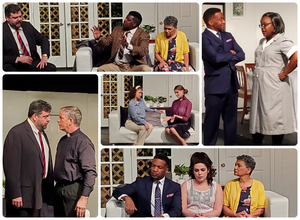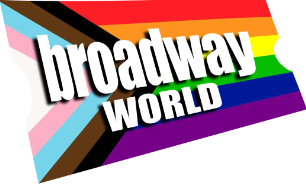Review: GUESS WHO'S COMING TO DINNER? at the Carrollwood Players
The production runs through February 25th.

"You can do the Watusi; but I AM the Watusi!" --Dr. Prentice in GUESS WHO'S COMING TO DINNER?
My uncle fumed. He had heard that my parents had thrown a dinner party, and shocker of all shockers, they had invited an actual, real-life interracial couple. This was Rockville, Maryland, in the late 1960s, and we lived in a whiter than white community straight out of The Wonder Years. The couple--a black husband, white wife--were dear friends of my parents; some close neighbors didn't come to the party because of the interracial couple's attendance there. And then came the call from my Southern uncle: "I heard rumors," he told my mother. "And I don't want you to tell me that there was a mixed couple at your party!" (He probably didn't say "mixed couple"; he probably used more eye-opening terms.)
"But they're dear friends of ours," My mother said.
"I SAID I DON'T WANT YOU TO TELL ME ABOUT IT!" my uncle shouted. And that was that.
I thought of that couple and their struggles while watching the Carrollwood Players' winning production of Todd Kreidler's GUESS WHO'S COMING TO DINNER?, based on the screenplay of the classic movie. The film was released right after the Loving v. Virginia ruling in 1967 (which finally allowed interracial marriage to be legal in the entire US), and the movie's meaning seemed overshadowed by its stars: Spencer Tracy (his last film role), Katharine Hepburn (in an Oscar-winning turn), and Sidney Poitier (one of the top box office stars of the year). I wondered how a play adaptation would work when dealing with such an iconic film. But if we scrub all thoughts of Tracy, Hepburn and Poitier from our heads, it surprisingly works wonders. It's funny that, after the initial appearance of the characters onstage, we seldom if ever really think of the actors who made them famous over fifty years ago.
GUESS WHO'S COMING TO DINNER? centers on a middle-aged well-off couple, Mr. And Mrs. Drayton: Matt's a liberal editor of a San Francisco newspaper and his wife, Christina, is the owner of an art gallery. Their 25-year-old daughter, "Joey," brings to their home a surprise guest, her new fiance, Dr. John Prentice, a black man that she met on a whirlwind 10-day romance in Hawaii. Add to the mix a feisty maid, Tillie, who disapproves of the mixed coupling and a heavily-drinking Monsignor who seems bent on enjoying the mayhem that the engagement announcement brings. When Dr. Prentice's parents arrive, the impending interracial nuptials are severely threatened; will all of these people come together in understanding and ultimately sit together at the dinner table of brotherhood? Or will they let their prejudices and short-sightedness destroy true love?
I worried that the play's message would seem dated and even quaint in the Age of Tyre Nichols. But we haven't progressed as a society nearly as much as you might think, and many of the fiery arguments in the play, which is rightly set in 1967, still smolder today.
Interestingly, one of the key comic lines in the play was edited out of the movie after the April 1968 assassination of Martin Luther King Jr. When she's informing her parents that Dr. Prentice's mother and father are on their way, "Joey" asks the title question: "Guess who's coming to dinner?" And Tillie answers, deadpanned: "Martin Luther King?" The line was deemed too insensitive after King's killing, but as time moved on, this line was edited back into the film...and is also, gladly, included in the play. It received guffaws from the audience.
In fact, I don't remember the movie--often called a "comedy-drama"--being this funny. But when you have Kym Welch as Tillie in this onstage version entering and exiting with precise comic timing, shooting off barbed one-liners, be prepared to laugh quite often.
The acting is mostly first rate. Once you've pushed thoughts of Spencer Tracy out of your heads (it takes a few moments), the formidable Eric Misener as Mr. Drayton certainly grows on you. Mr. Misener has that deep, mountain-moving voice. He delivers his lines sometimes like bullets from a gun. Speaking of Vietnam (here referred to just as "the war"), he states, "Our country hasn't been this wrong since we stole Texas." But it isn't until his final monologue, gorgeously written and supremely acted here, that I realized what a treasure Mr. Misener is. He says, "There'll be a hundred million people right here in this country who will be shocked and offended and appalled and the two of you will just have to ride that out, maybe every day for the rest of your life...But you're two wonderful people who happened to fall in love and happened to have a pigmentation problem..." He sells the lengthy rant for all its worth, earning much applause. You could feel his passion, his love for his daughter and his wife, and his struggle between his liberal worldview and the personal troubles that lay in front of his daughter and her fiance. He acknowledges his hypocrisy, and his conclusion will move you greatly. Wonderful work by Mr. Misener here.
Penni Willen as Mrs. Drayton, the part made famous by Katharine Hepburn, gives the best facial expressions imaginable. As her daughter, "Joey," Jessica Duncan is a welcome sight on the stage. My main qualm is that she almost broke character at one point, and if you're not Harvey Korman or Tim Conway, this is a no-no. Elle Mientek as Hilary St. George, an art gallery employee of Mrs. Drayton's and the closest thing to a villain here, is appropriately snootily obnoxious, though I never quite bought into her as an actual human being, more like a snobby caricature. She walks like she's swimming in air. And Jim Gunning is welcome stability, the audience surrogate, as the boozing Monsignor Ryan.
Terry Spann as Dr. John Prentice, the part made famous by Sidney Poitier, is sensational. If you're looking for a solid, stoic Poitier type of characterization here, then think again. Mr. Spann makes the part his own. He's alive, dynamic, passionate, much more lively than Mr. Poitier, and though the doctor is highly successful and renowned, you get the feeling the character never could get his dad's admiration. When he confronts his father, sparks fly. His diatribe in Act 2, aimed at his dad, earned enormous applause: "You and your whole lousy generation believes the way it was for you is the way it's got to be. And not until your whole generation has lain down and died will the dead weight of you be off our backs! You understand, you've got to get off my back! Dad...Dad, you're my father. I'm your son. I love you. I always have and I always will. But you think of yourself as a colored man. I think of myself as a man..."
As Dr. Prentice's father, the brilliant Gerald Honeywell nearly steals the show. He has incredible comic timing, and sometimes he can just give a look that will leave the audience in stitches. He's full of fire, and at the end offers a line so comic that I burst out laughing (as did the audience, which also applauded it). As his hapless wife, Melanie Payne holds her own and offers a more level-headed view of the situation.
As strong as the overall group is, in the end it's really Kym Welch's show. I first saw Ms. Welch in Doubt on this very stage nearly a decade ago, and she hijacked that whole play in a mere ten minute scene. Here, as the maid, she spits out snappy dialogue with masterful timing. She is not a fan of Dr. Prentice, and when they finally do bond, it's a heart-tugging moment (Ms. Welch also gets to display her remarkable singing chops). It's not hyperbole to suggest that Kym Welch is so good here that she needs to be in every show everywhere all at once; this is one of the best performances I've ever seen grace the Carrollwood Players stage.
Director Emily Nettnin guides her cast splendidly, with nary a wrong note. The show started off slowly and shaky, but then caught its stride and never looked back. Wonderfully paced, not too rushed, not too slow.
The tidy set of the Drayton household works well enough, all of it very white--white walls, white chairs, white tablecloth. Even the Picasso print on the wall is mostly white. Whether on purpose or not, it sets the stage for a world that the white characters who live there will soon realize is not always so white.
Before seeing the show, I questioned if this play would work or not, or would the movie (of which I've seen several times) cloud our opinions? I needn't have worried. It was an extremely entertaining evening, and the audience rose for an immediate standing ovation afterwards. And there was so much laughter from the audience throughout, followed by the seriousness and understanding. There are so many good things to recommend, but what I take with me is the final moments of this play, which needs to be seen: All of these characters walking to the table, together, as Simon and Garfunkel's "America" plays. This is the moment that I take with me. This is the moment that I wish that our troubled world will follow suit.
GUESS WHO'S COMING TO DINNER plays at the Carrollwood Players until February 25th.
Photo Credit: Beth Behner
Comments
Videos
